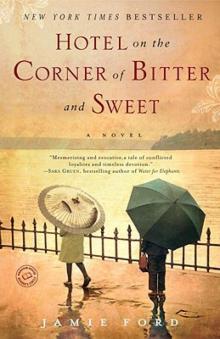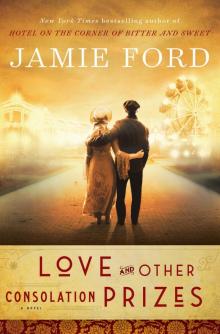- Home
- Jamie Ford
Love and Other Consolation Prizes Page 2
Love and Other Consolation Prizes Read online
Page 2
His ears popped and he heard the familiar booming of mortars and the rattle of gunfire. He watched as the horizon lit up with flares and the flash of cannons. Then the sky was dark again and everywhere he looked, it was raining stars.
UNBOUND
(1902)
The man who was not his uncle came for Yung in the morning. A white merchant with a ruddy beard, he removed his elegant suit jacket and rolled up his shirtsleeves to reveal an array of old tattoos. He squeezed Yung’s arm, pulled his hair, looked in his ears. He then smiled and nodded as his translator, a remarkably fat Chinese man, clapped his hands and shouted, “Hay sun la!” waking other children—a host of girls and a handful of boys, who had gathered in and around the cemetery during the night. All of them seemed older than Yung, grade school age at least, or well into their teens. Some had rolls of bedding and carried their belongings in bamboo baskets attached to long sticks, topped with netting, while a few of the older girls wore modest, hand-sewn dresses and tied their hair with red strings. But just as many were like him, in rags, barefoot. And all of them stared at Yung when they realized he was a mixed-blood child. He recognized the look, not one of curiosity or contempt, but an expression that said, I may have nothing, I may be homeless and starving, but at least I’m not him.
Yung ignored their attention and tried not to think about his mother as they followed the men away from pillars of black smoke and the sounds of gunfire that were rising in the distance. They walked for hours, Yung taking two steps with his little legs for every one of theirs, as he struggled to keep up. A tributary of sadness flowing into a greater stream of refugees that became a flood of humanity, traveling away from the sound of thunder in a cloudless sky. They boarded a boat, which took them to a city on the Pearl River. When they arrived, in the shadow of a great ship, the salty air made Yung’s mouth water, though the only signs of food were the bones of fish that had been recently caught, cooked, and eaten, on the banks of the murky water.
Yung’s eyes grew wide as he gazed up at the massive freighter, with four masts and an enormous funneled stack. Everyone spoke of the Chang Yi, but he didn’t know if that was the ship’s name, or if they were referring to the man who was not his uncle.
Swirling black smoke from the stack muddied the sky, turning the sun a ruddy orange, and Yung wondered how such a stout ship could move. Then he felt his legs tremble from the vibrations of a great steam engine. His body was haggard, weary and numb from the march, but he was grateful to be upright as he watched a group of Chinese stevedores pulling an oxcart bearing a dozen elegantly dressed girls with bound feet. Yung heard a shrill whistle as they were unloaded, limping, while a white marine officer parted the crowd and began yelling in broken Chinese, “Line up and be silent!”
The officer pointed and snapped his fingers as Yung queued up and they were poked and prodded, noses counted.
The officer culled those with rickets or those with stooped backs. That group was herded away from the ship, back toward the heart of the city. Yung watched as the boys and girls obviously stricken with lice and mites were doused in foul-smelling waters, given a change of clothing, and then taken to another vessel.
Yung overheard the sailors chattering back and forth in Chinese, Portuguese, and English, which he understood just enough to gather that they were blackbirders.
His mother had once talked about these men—sailors who sold poor Chinese to plantations in Hawaii, outlaws who smuggled workers into the western world, and brokers who delivered brides to lonely men in the gold mountains of Gum Shan—the rich and mysterious frontiers of North America.
Despite those warnings, Yung’s heart quickened as he began to smell real food—roast chicken, garlic, and other savory spices, emanating from the ship, wafting on the breeze.
The officer yelled boarding instructions, and Yung was ushered onboard with his tiny knapsack of clothing. He could see another gangplank leading up to the front of the ship, where the man who was not his uncle had donned a coat and top hat and was hosting elegantly dressed men and women, Asian and Anglo, on a forward deck. There were men in military uniforms and a host of Chinese officials. Yung stared, his mouth watering as he watched them eat, and drink wine from long-stemmed glasses. He and the other children and teens were herded below, through narrow hallways, past crew cabins, and beyond rows of bunks crowded with shirtless Chinese sailors who sported brands on their chests and scars on their backs. Yung followed as they were taken down into what felt like the bottom of the ship, to a cargo hold that smelled of coal dust and stale urine. And there was a constant mechanical thrum coming through the walls that he could feel as well as hear.
As his eyes adjusted to the dimly lit space, Yung could see that the cargo hold had been converted into a living quarters, divided into racks of bunks and rows of low-walled pens, with woolen blankets and straw mattresses. He was assigned to a pen with five other boys, who looked at him warily. A group of peasant girls, some with bound feet, perhaps eight or nine years of age, were put in pens directly across from them, while the teenagers in silk cheongsams and lacy European dresses, with high necks and tight collars, were put in a locked wooden paddock toward the rear of the room. The iron bars suggested the place had previously been used for storing precious cargo. Yung watched the sailors regard the comely girls the way his mother and he used to hungrily stare at street vendors cooking fresh siu mei. That’s when Yung realized the well-dressed girls had been locked away for their own protection.
“You will sleep here, you will live here, and you will spend the entire month at sea belowdecks,” barked a Caucasian man in a dark blue uniform. He spoke English, which Yung assumed only a handful of children understood. The man removed his cap and rubbed his chin, feeling the blond scruff of a close-cropped beard. He introduced himself as the ship’s chief medical officer. “You will stay here, otherwise you risk catching and spreading a coughing disease.” The doctor pointed to his chest. “I will conduct daily health inspections. If one of you gets sick, or is stricken with a rash that bleeds, you will not be allowed to threaten the rest of the passengers—you will be thrown overboard. No exceptions. There is no mercy at sea. Is this understood?”
Yung nodded, wide-eyed as a Chinese crewman translated the doctor’s words. The boys in his pen, the ones who had been lounging on the floor, immediately sat upright. Yung looked around, wondering who might be sick. He didn’t dare sneeze for fear of being dragged back on deck and cast over the side.
There were hushed whispers followed by a nervous pause.
Then a horrible wailing began as the young doctor drew a long, hooked knife from a satchel and went about the room, cutting the soiled cotton bandages that bound the feet of many of the girls, both the rich and the poor. Yung could hear their crying as the girls’ painful feet were touched, moved, the popping of bone and cartilage as they tried to flex and put pressure on their lotus-shaped stumps. For the younger ones he could tell that this was a euphoric feeling of freedom and relief, but for the older girls, their feet long since broken again and again, this brought more pain than comfort.
“You will feel better in a few weeks,” the doctor said as he threw the dirty bandages into a wooden bucket. The cotton smelled like blood and herbs and rot.
As girls sobbed, the elegant teens in the paddock sniped at them, “Stop mewling. You’re embarrassing yourselves. Show respect.”
Even as a little boy, Yung recognized their Yue dialect and understood they must be merchants’ daughters, of a higher quality than the rest of the children. A few of the poor girls spat back at the teenagers until the sailors began hitting them with rattan sticks.
The older girls looked on, smiling proudly. Better to be a caged peacock, they must have thought, than to live free as a pigeon.
Yung sat down and noticed that the group of peasant girls across from him had kept to themselves. A few of them wiggled their toes for the first time in months and nursed the pale skin on their feet, but none of them cried.
&nb
sp; The boys in his pen mocked them and sneered as they shouted, “lou geoi,” laughing until a crewman snapped at them.
Yung didn’t know what lou geoi meant, but he knew the words were an insult of some kind. His mother used to fight back tears whenever Chinese men or European sailors whistled and called her that on the rutted streets of their village.
Yung noted how the girls all styled their hair in long braids and they wore dirty clothing made from hemp and ramie. They looked like the lowest of the low—poor girls whose parents had bound their daughters’ feet in an effort to dress them up. Only one of the girls’ hair was unbraided, and she also stood out because of her faded blue robe and wide belt.
Yung was beginning to ache for his mother when sailors brought rags and buckets of fresh water to each pen. He waited until the older boys were done cleaning up and then took his turn. As Yung washed his face and teeth, he gazed into the half-empty bucket of dirty water. His reflection rocked back and forth, swaying as the ship began to move.
He glanced around and noticed that one of the older boys had snatched the bucket from the nearby girls, who had just stared back in contempt. Yung thought about the sister he’d had for a brief moment, and then he carried his bucket to the peasant girls’ side and offered it to them. They all looked at him strangely, suspiciously as he urged one of them to sit at the edge of the mattress. He knelt, placing one, then both of the girl’s feet in the cool water. Yung had once watched his mother treat a cousin this way. He rubbed the arch of her foot; then pushed her toes back, stretching them gently with his small hands. As he washed the girl’s feet with the damp cloth, she winced for a moment, inhaled deeply, then relaxed. He wrung out the towel and handed the cloth to another girl, before returning to his pen. There he found an unoccupied corner of the mattress as the boys looked at him with scorn.
—
THAT NIGHT, YUNG woke as the steam engine rumbled loudly along with his empty stomach. He sat up and realized that the other boys were snoring and that the oldest, a stout bully name Jun, had taken many of the blankets, including Yung’s, for himself. The cargo hold was cold now, and he clutched his knapsack on his small corner of the shared mattress. And as the ship rocked and swayed on the open sea, he realized that with each minute, each hour, he was being carried farther from his village, away from his mother, forever. He wiped his eyes, and in the glow of a single, wall-mounted lamp, Yung could see that some of the girls across from him were awake, staring back. They whispered among themselves and then lifted a corner of the blanket they were sharing.
“Little brother.” One of the girls motioned. “Come over here.”
Yung glanced at his sleeping bunkmates. Then he stepped lightly, nervously, with bare feet on the cool wooden floor. He hesitated, worried that this might be some kind of cruel joke. Then one of the girls reached up, tugged his sleeve, and pulled him beneath the covers. They made room as he nestled among them. He felt cold feet next to his, hands and arms, as they patted his chest and shoulders.
“It’s okay.” A girl spoke in a small voice. “You’re one of us.”
Yung looked at the girls. “What do you mean?”
The girl in the blue robe sat up partway and peeked over at him as if the answer were obvious. She spoke Chinese with a thick accent. “Nobody wants us either.”
Yung swallowed the bitter medicine of truth. He nodded, closed his eyes, and felt the tickling of their hair on his cheeks, on his neck, as they all settled in beneath the covers. Despite the sharing of the wash bucket, their clothing smelled old and musty, like his—reeking of weeks of smoke and dust. Yung didn’t mind. Nor did he care what the other boys would think in the morning. He was used to people staring at him on the street—the villagers who’d spat at him or laughed. But for now he felt safely surrounded, comforted, as he drew a deep breath and melted into the girls’ kindness.
THE WATER TRADE
(1902)
If Yung had worried about being harassed by his former bunkmates and Jun in the morning, he had little to fear. Seasickness kept everyone in bed, eyes closed, groaning—everyone but Yung, that is.
The doctor told him his sea legs were a natural advantage of being the littlest, the smallest. Yung nodded and watched as the older boys and the young women turned pale and retched up the broth they’d been given. Vomit now speckled their clothing, their shoes, their shimmering gowns.
Yung busied himself by emptying the reeking pails of night soil, washing dinner tins, and ministering to the girls in his pen, helping them take sips of the ginger tea they’d been given to ease their nausea. His new bunkmates were always grateful, whispering, “Thank you, Little Brother,” which had become his de facto name. They’d introduced themselves one by one as Gwai Ying, Quan Gow Sheung, Wong So, Leung Gin, Fong Muey, Mui-Ji, Hoi, and…something else, but he couldn’t possibly keep track of who was who. They’d explained that the curious girl in the blue robe was Japanese and had been sent to China by her family, sold to an inn where she’d been working as a maid until the owner died and her contract was bought out. The strange girl smiled and spoke Chinese, but when she said her name, Yung couldn’t understand the words. He addressed all of them as Big Sister.
On the fourth day, when most were beginning to recover—to sit up and walk about, to play cards or games with string—they were given solid food—the first real meal Yung had tasted in more than a week. The simple offering of sticky rice balls and dried fish made everyone moan with delight. Yung wanted to savor the salty rice, but like everyone else, he ate furiously, almost violently, chewing, swallowing, and gulping as though the food might be snatched from his hands at any moment.
Yung was licking his fingers after dinner when the doctor appeared with a crewman and made his normal round of inspections. Everyone stood as tall as they could, arms at their sides; no one dared to cough or sniffle or even breathe in a manner that might be confused with illness. They waited as the doctor slowly walked by, leather heels squealing on the floor, nostrils flaring. Occasionally he would stop to look into a mouth, or a shirt would be removed so he could examine the skin on a child’s back.
Yung chewed his lip as the man, whose breath he could smell, stopped in front of him. Then he lit a cigarette and pushed Yung aside as he directed his attention to the girls, especially the one in the blue robe. He ran his fingers along her neck, removed her wooden hairpins, and toyed with the tresses that hung about her shoulders. He shook his head and then turned back to Yung, who stood out among the girls. The doctor patted him on the shoulder and moved on. Yung listened as the doctor chatted amiably with the other boys, telling them to stay out of trouble. He slapped Jun on the cheek and jerked his ear, playful, but hard enough to make his point. Then the doctor stopped at the paddock of older girls.
They all smiled and kowtowed. He snapped his fingers and said, “That one.” He pointed to a girl in a lavender dress as a sailor stepped forward with a key and opened the groaning iron door.
The merchant’s daughters seemed shocked, confused, and then compliant as they stepped away from the tall, slender girl.
“But…Sir Doctor, I’m not ill—not even seasick anymore,” the girl in lavender protested, pleading in her native tongue. “I feel fine, look at me, my skin is perfect, and my hair is shiny and clean.” She tilted her chin as she shook her head and her tasseled earrings swayed back and forth. “I haven’t coughed once.”
The crewman translated as the doctor dropped his cigarette on the deck and snuffed it out with the tip of his shoe. “I know. That’s why you’re coming with us.” He smiled politely as his words were translated into Cantonese. “We will take care of you upstairs. We wouldn’t want you wasting away down here.”
The color drained from the girl’s face. She smoothed out the lace on her dress and nodded, seemingly resigned. Yung heard the doctor ask the girl, as he led her away, if she liked the taste of baiju, rice wine. And then they were gone, leaving nothing but the pregnant silence.
“They’re not going t
o throw her overboard, are they?” Yung asked the girl in the blue robe. She didn’t answer or seem to understand the question. But the boys snickered.
—
THAT NIGHT, AFTER Yung and the girls finished dinner, they piled onto their mattress and played a whisper game. One would whisper something to the person next to her and then that phrase would be passed down the line and back again. It never came back unchanged, and that was the fun. Yung had seen the game played before in his village, but he’d never been included.
He waited, and the girl next to him finally turned and whispered, “I’m a hairy dog that bites,” in Cantonese. He clapped a hand over his mouth to keep from laughing. He collected himself and then passed the message along to the Japanese girl in the blue robe. She looked confused, furrowed her brow, and did her best to whisper something on to the girl next to her.
The messages went back and forth, from “My diaper is full” and “Whipped with a cane” to “You’re my pretty servant” and “Jun is your ugly lady-boss.” That one made Yung laugh out loud. When it was Yung’s turn to make up a phrase, he thought of the silliest thing possible. He said to the girl in blue, “I’m going to marry you.”
The Japanese girl crinkled her nose, then her eyes grew wide and she laughed.
But the phrase was taken more seriously as the words moved further down the line. The girls murmured it solemnly, sighed wearily, shook their heads, and eventually returned the message as though relaying a bit of bad news. To Yung it felt as though all the joy, all the laughter, had been snuffed out like a candle.

 Songs of Willow Frost
Songs of Willow Frost Hotel on the Corner of Bitter and Sweet
Hotel on the Corner of Bitter and Sweet Love and Other Consolation Prizes
Love and Other Consolation Prizes Songs of Willow Frost: A Novel
Songs of Willow Frost: A Novel